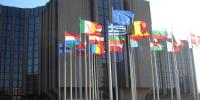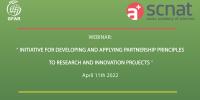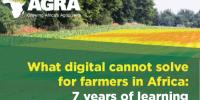15th April, 2010
Dear Colleagues,
I am sure you are aware that Bharat Krishak Samaj (Farmers’ Forum, India) serves the causes of all farmers and provide a useful platform to voice their opinions and views. Like the change in understanding of food security in India, BKS too has evolved, from a non-political, non-sectarian association of farmers and all those who are interested in the promotion of their welfare, to a unique platform that also advocates, singularly, the crucial need for India to focus on farmer-led economic growth.
I would like to quote some of the excellencies from GCARD 2010 at Montpellier (France). Though they are not directly involved with the working of CGIAR and GFAR, they provided very valuable concerns for, agriculture research and development.
Mr. Kofi Annan, Former Secretary General, United Nations said “It is our share of global responsibility to shape agriculture that will alleviate hunger and poverty and promote sustainable development in face of climate change and empower every human being.”
Mr. Robert B. Zoellick, President World Bank Group, said “Today 1.4 billion people around the world are living in extreme poverty. Many are women & children and most of them are farmers, yet they are hungry everyday.”
Mr. David Nabarro, United Nations Secretary General, Special Representative on Food Security & Nutrition, said “Many of the condition that led to soaring food crisis in 2008 are still with us. We have to shape a new food system that inspires robust partnership of those who have knowledge and those who need on it, inclusive of the full involvement of many different kind of stakeholders including farmers’ organizations.”
GCARD 2010 was a grand success by the mere fact that over 850 agriculture stakeholders from across the world could interact, participate, and deliberate on issues related to future of agriculture research and development. I am delighted to have had the opportunity to attend the conference in Montpellier. Now, I feel in the words of Albert Einstein, "The more I know, the more I realize that less I know".
Most of the issues were covered at length. However, some of the issues need more thought. According to us, the issues that GCARD/GFAR should address now are:
1. Currently, petroleum is the single most important input in modern food production - it serves both as a fuel for tractors, food transportation and as the chemical base for fertilizers and pesticides. This is gradually becoming scarce and expensive thus threatening global food security. Cheap energy is not an option anymore. If the price of crude oil was to increase to 150 – 200 US$ per barrel (which is bound to happen in the next decade), agriculture as we know today will cease to exit. Hence, we need to invest in practices that minimize use of petroleum products.
2. Fresh water is fast depleting not only due to climate change but due to intensive agriculture practices. Extraction and the resultant depletion of ground water and receding glaciers will lead to less availability of drinking water let alone the water for agriculture use. Need to cultivate crops that are less dependent on inputs including water.
3. “Food security” was a common word used quite often as the word “Partnership” in most drafts circulating during the conference. Please remember that “Food Nutrition” rather than food security better addresses the issues of under nourishment. With focus on food security we are investing in systems that basically target staple crops like wheat and rice. Instead we need to focus on crops like legume / pulses and also the livestock which are raised by resource poor farmers in areas which are mainly dependent on rainfall. These will provide required nutrition and protein for human physical development.
4. The infrastructure and process of marketing and distribution play a very significant role in reducing food shortages, controlling spiraling cost of food grains and price variations, as well as undernourishment of the masses. Good infrastructure and distribution processes have a multiplier effect on R&D expenditure.
5. Animal husbandry & aquatic farming are important for abolishing undernourishment and poverty. Help in attaining self sustainability and inclusion in growth of the economy.
Research funding has an enormous influence on the character & success of future food systems. Therefore, it is important to invest scant monetary resources in a manner that will bring maximum benefits to the poor and hungry.
A question that is frequently debated is; Can food can be grown in the developing world, where the hungry can actually get it at prices they can afford? The answer is, yes provided we address the vital issue of sustainable practices on how much one acre can produce not for one year but for a thousand years.
Farmer organizations across the world play a vital role on two fronts:
1. We build awareness amongst the farmers on policies and issues of the Government by explaining how they get affected by their policy decisions. We also dissect information of best available agriculture practices so that the farmer can make an informed decision for their adoption.
2. We also build an understanding within the Government and try to exert needed pressure on the policymakers from the outside to help and to bring focus on the growth of agriculture sector.
Accordingly, it is our considered view that a mechanism to support farmer organizations needs to be evolved. As you would agree, the value of good communication, building pressure on policymakers, awareness and information dissipation to farmers cannot be underestimated. Hence, CGIAR and GFAR need to work closely with us to evaluate resultant gains.
The World Bank Development Report 2008, shows GDP growth in agriculture is about 3 times more effective in reducing poverty than growth in other sectors.” To abolish hunger, we need to double food production in next decades. This is a difficult task because of climate change and various other factors, as was highlighted during the GCARD.
In general the world is dissatisfied with the present situation. Participants at GCARD 2010 have shown a compelling vision for a better future. The change that CGIAR is undergoing and the response of GFAR at GCARD 2010 is the first step in the process.
In India, we pray for a good monsoon. In the same way, we pray that under the able leadership of Dr. Monty Jones, Chair of the Global Forum on Agriculture Research (GFAR), we succeed in our endeavour to increase food production sustainably and thus aim at abolishing hunger.
The countdown of the 104 weeks to the next GCARD Summit has begun and one week has already lapsed. The world is watching to see whether we achieve promised results. The task ahead is indeed enormous and can only be achieved by our concentrated effort in an equitable partnership mode.
Since your organization can change the lives of people, it is our earnest submission to you to support the cause of farmers for overall prosperity.
Thanking you.
Yours Sincerely,
Ajay Jakhar
Chairman, Bharat Krishak Samaj



















